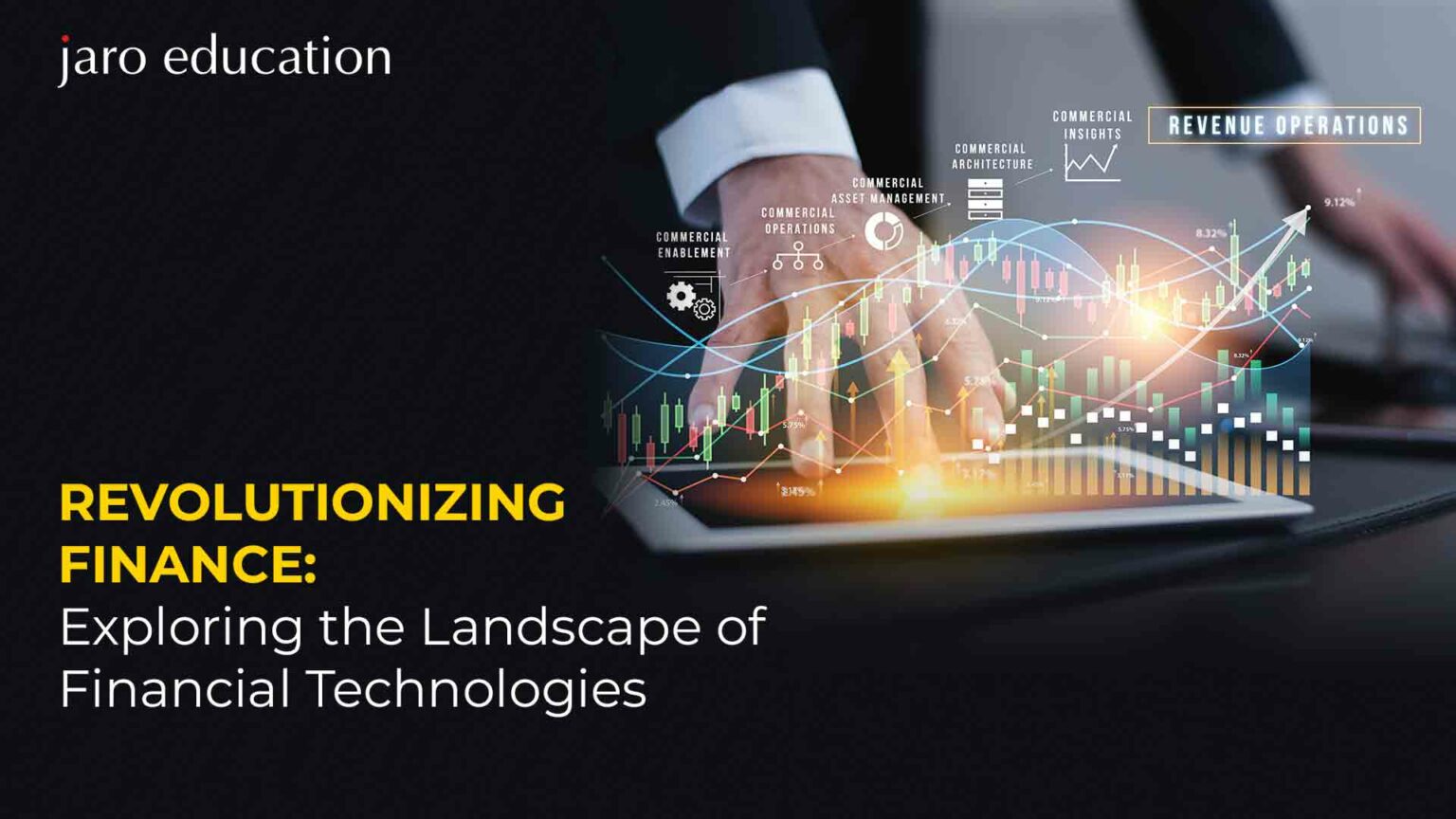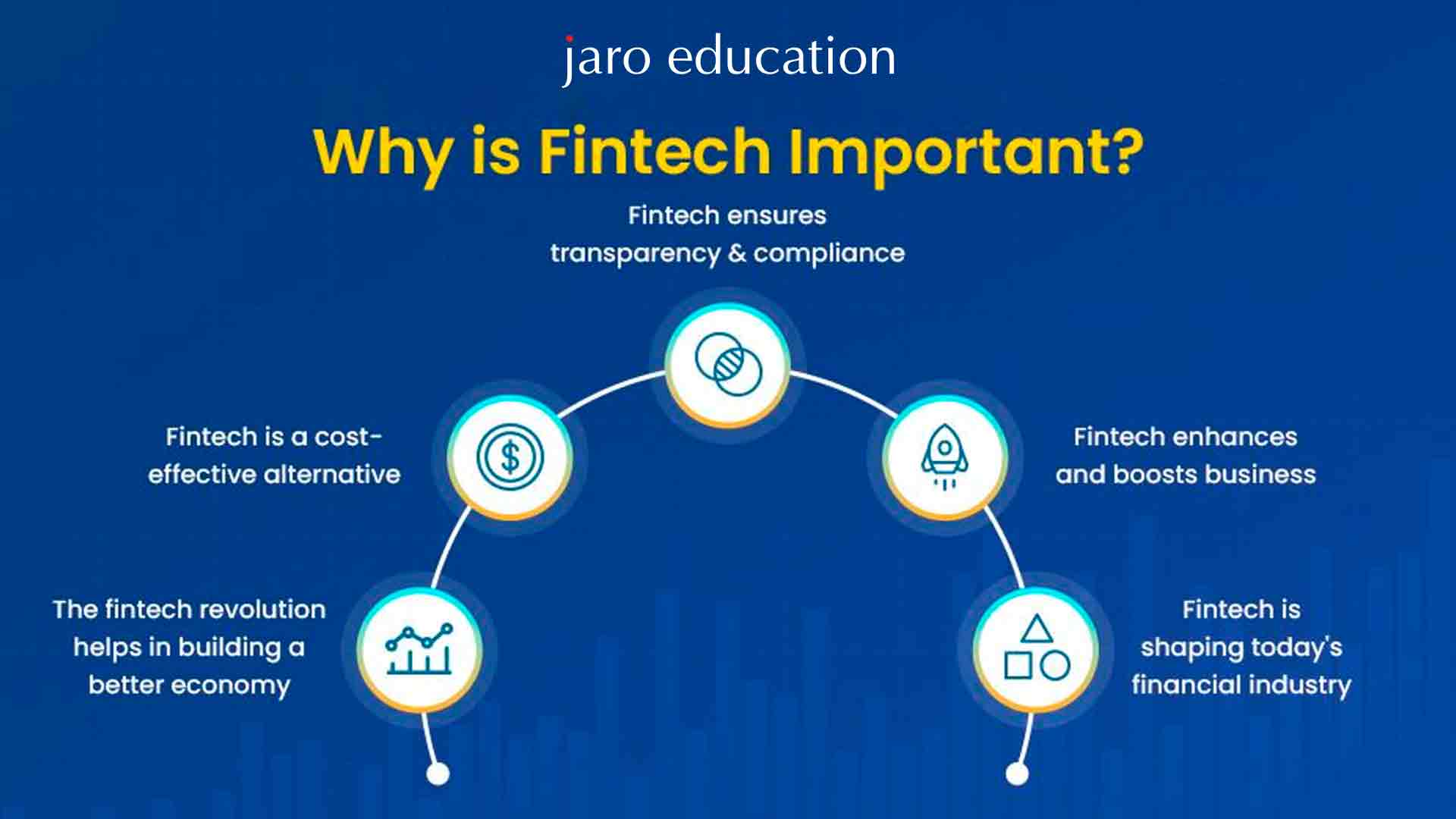Revolutionizing Finance: Exploring the Landscape of Financial Technologies
Table of Contents

- jaro education
- 4, November 2023
- 11:07 am
Finance plays a role in today’s economy, exerting influence. It covers numerous topics, including banking, investments, lending, insurance, payments, and more. The impact of finance is felt by individuals, businesses, and governments in many ways. However, navigating and managing the complexities of finance can be quite challenging. It involves handling amounts of data, complying with regulations, mitigating risks, and facing uncertainties. Accuracy, efficiency, transparency, and security are paramount in this field. This is where financial technologies (fintech) come into play. Fintech refers to the utilization of software applications and other technological advancements to enhance and streamline the business processes. Its purpose is to offer solutions for issues while opening up new avenues for growth.
Fintech, or financial technology, is transforming the way we interact with money and financial services. The innovations in fintech include digital payments, loans, crowdsourcing, blockchain, cryptocurrency, robo-advisors, and others. Consumers, companies, regulators, and society at large face new opportunities and difficulties as a result of these technologies.
To comprehend and navigate the fintech world, you must first understand the ideas, principles, and applications of financial technology and financial analytics. That is why you should register for IIM Ahmedabad’s Advanced Programme in Financial Technologies and Financial Analytics. This online program will furnish you with the skills and expertise needed to emerge as a frontrunner in the field of fintech.
What is Financial Technology?
Fintech may appear to be a sophisticated phrase, but it is merely an abbreviation for “financial technology.” It covers all the fascinating technologies that simplify banking and other financial complexities. Fintech may range from simple mobile payment apps to sophisticated blockchain networks for safe transactions.
Fintech came into picture in the twenty-first century to address the changing demands of our digital environment. It uses the internet, cloud computing, artificial intelligence, big data, and other technologies to deliver faster, cheaper, and more accessible financial services.
It is divided into four categories: payments, lending, wealth management, and insurance. Each has its own set of obstacles and possibilities.
Payments
Payments are the most common and widely used fintech segment. It’s all about shifting money around with the help of digital platforms. Payments made with the use of financial technologies are faster, safer, and less expensive than traditional ways. PayPal, Venmo, Stripe, Apple Pay, Google Pay, and Alipay are just a few examples.
Lending
The second significant segment, lending, is all about providing loans or credit through Internet channels. Fintech financing is adaptable, transparent, and cost-effective. LendingClub, Prosper, and SoFi are changing the game by making borrowing and lending easier than ever before.
Wealth Management
Wealth management assists you in growing your money. Fintech, in this context, refers to the online provision of investing advice and services. It is inexpensive, personalized, and automated. Companies like Betterment, Wealthfront, and Robinhood are pioneers in this field.
Insurance
Insurance is the fintech segment that is popular among various populations. Fintech insurance is all about customization, transparency, and innovation, rather than just simply providing insurance services. These days, insurance companies such as Lemonade and Oscar Health are making it smarter and easier to comprehend.
Why is Financial Technology Important?
Fintech is important because it has the potential to transform the finance sector in various ways. Some of the benefits of fintech are:

*radixweb.com
Improves Customer Experience
Fintech offers customers more choices, convenience, control, and value for their money. Customers can access financial services anytime, anywhere, using their smartphones or computers. They can also compare different options, tailor their preferences, monitor their transactions, and provide feedback easily.
Enhances Financial Inclusion
Using fintech lowers the barriers to entry for financial services for underserved or unbanked populations. It provides alternative sources of funding, credit, savings, insurance, and education for people who lack access to traditional financial institutions. Additionally, it also enables cross-border remittances, donations, and trade for people from different countries or regions.
Amplifies Operational Efficiency
Fintech reduces the costs, risks, errors, and delays associated with manual or paper-based processes. It automates, streamlines, standardizes, and integrates various financial operations using software, algorithms, and applications. Furthermore, it optimizes resource utilization, performance measurement, and decision-making using data analytics, artificial intelligence, machine learning, and cloud computing.
Fosters Innovation and Competition
Fintech creates new markets, products, services, business models, and revenue streams for financial providers. It challenges incumbents to adapt, improve, or collaborate with new entrants and empowers customers to demand better quality, price, and service from financial providers.
What is Financial Analytics?
Now, let’s understand another segment in this field of fintech: financial analytics. It is a pivotal tool that uses data and tech to help make smart financial decisions. Financial analytics involves collecting, processing, analyzing, and showing off big piles of financial data with software and fancy tools.
Financial analytics can be a game-changer in lots of financial areas:
Financial Performance
It helps to keep a track on how well an individual, business, or project is doing financially. You can track things like income, expenses, profits, cash flow, and how much bang you’re getting for your buck. It’s also a pro at predicting future money situations.
Financial Risk
Financial analytics helps to spot and deal with financial risks. It can tell you how likely things like market changes, credit problems, or fraud are to mess with your money. Also, it has tricks up its sleeve to help you avoid financial disasters.
Financial Valuation
Financial valuation is a part of financial analytics that focuses on determining the value of something. It can be applied to entities, including individuals, businesses, projects, or assets. By conducting a valuation, people can make decisions when buying or selling, investing, or evaluating something. Financial analysts employ methods and techniques for valuation depending on the type and purpose of the assessment. Examples of used approaches include discounted cash flow analysis, market multiples comparison, net asset value assessment, and relative valuation techniques.
Financial Strategy
Financial strategy refers to the approach of organizing and controlling your assets in order to accomplish your desired objectives. This encompasses establishing goals, assessing your circumstances, devising an action plan, and continuously monitoring and adapting it, as required. By employing strategy, you can effectively optimize your income, expenses, savings, investments, and debt management.
Why is Financial Analytics Important?
Financial analytics isn’t just about charts and graphs; it’s an integral part of the financial sector. The importance of financial analytics can be reflected in the following points:
Accuracy and Reliability
Financial analytics cuts down on errors and gives you reliable financial info. It also factors in risks to make sure your financial plans are on the right track.
Visibility and Transparency
It provides real-time, accurate financial information for reporting and auditing, while keeping everyone involved in the loop. Plus, it makes sure everyone follows the rules.
Control and Monitoring
Financial analytics maintains a close check on your financial performance. It monitors your financial plans and assists you in correcting any deviations.
Problem Solving and Decision Making
Financial analytics helps to analyze all the data and offer solutions. It’s like having an expert by your side to assist in decision-making and finding appropriate solutions.
How Can Individuals Benefit from Financial Analytics?
Financial analytics isn’t limited to fintech companies; it’s also beneficial for users using financial services. Here’s how:
Personal Finance
For individuals, financial analytics proves invaluable in managing money. You can keep track of your income, expenses, savings, investments, debts, and budgets. It even provides tips to improve your financial well-being.
Business Finance
For businesses, financial analytics serves as a goldmine of insights. It monitors cash flow, revenue, costs, growth prospects, and more. With its assistance, businesses can make decisions and plan for success.
Social Finance
In the field of finance, financial analytics plays a significant role. It connects users with interests while ensuring trust and transparency in social finance activities.
So, if you want to learn more about fintech and how it is revolutionizing the finance sector, you should consider enrolling in the Advanced Programme in Financial Technologies and Financial Analytics from IIM Ahmedabad. This is a unique online program that will help you master the latest technologies, tools, and techniques for financial innovation and analysis under the guidance of the best faculty and industry experts, who will guide you through real-life scenarios and challenges. With that, you will also get a chance to visit the IIM Ahmedabad campus for four days as a part of campus immersion, where you can network with your peers and mentors. Additionally, upon the completion of this program, you will earn a certificate of completion from IIM Ahmedabad, one of India’s premier business schools, and an IACBE accredited Institute. Register with Jaro Education to learn more about this program and get started soon.







2 thoughts on “Revolutionizing Finance: Exploring the Landscape of Financial Technologies”
Managing credit card processing for high-risk businesses can indeed be challenging. We’ve found that working with specialized payment gateways designed for high-risk merchants is essential. They provide secure and compliant solutions tailored to specific needs.
This is an insightful article on how financial technologies are transforming the finance industry! It highlights key innovations reshaping the landscape and driving efficiency in financial services. A must-read for industry professionals.